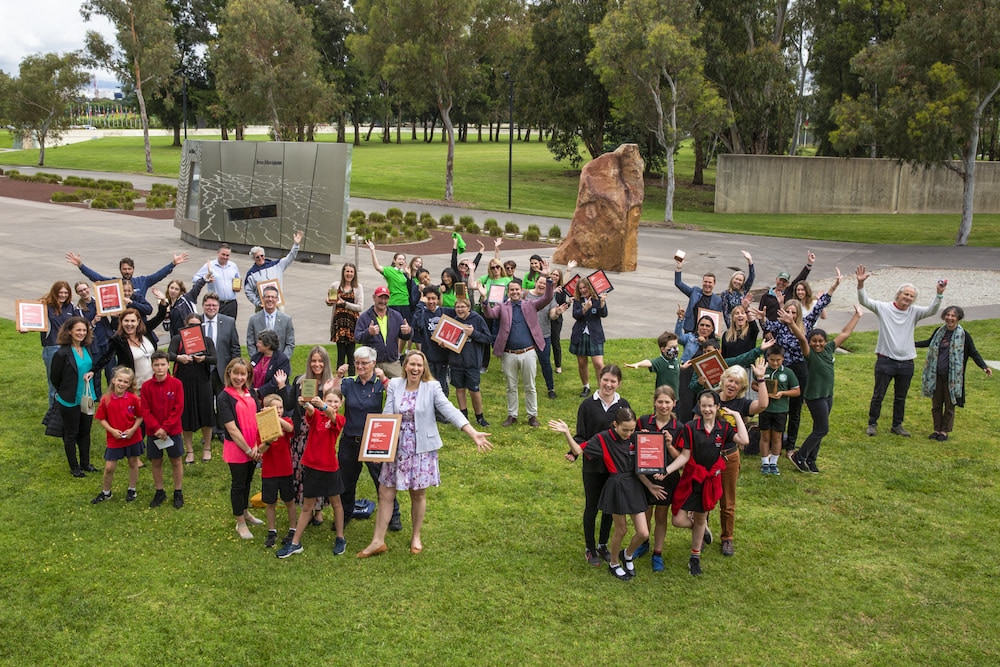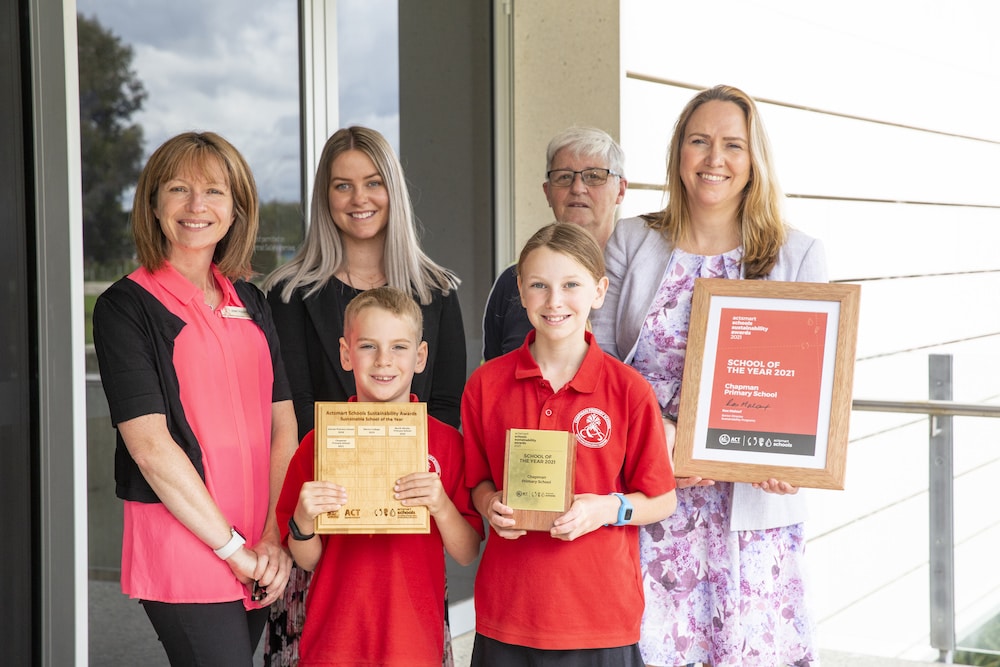There will be cheering in the corridors at Chapman Primary School today. Chapman was named the ACT Sustainable School of the Year in a ceremony at the National Portrait Gallery this morning.
“We are incredibly excited,” said teacher Libby Emerson, the school’s sustainability co-ordinator. “Chapman Primary School has worked towards this for many years.”
The Actsmart School of the Year award recognises schools that have embedded climate action in their culture or school, and have improved their sustainability across five focus areas.
Chapman Primary (the citation read) fought against litter, tackling chip packets and disposable masks, and introduced waste-free lunchboxes every day. Students made sure no lights or screens were left on during breaks; made bee hotels and planted pollinator gardens; and ran a water-saving awareness campaign that led to no water being wasted in the school this year. Lessons were held outside to reduce the school’s energy consumption. Active travel was so popular there weren’t enough bike racks. All staff undertook sustainability personal development.
“The whole school is behind this,” Ms Emerson said: “The P&C, the canteen, the parents who pack nude food lunches…” From kindergarten on, students learn about different aspects of sustainability – so that when they leave in Year 6, they are ready for the world.
Annie (Year 3) spends her lunchtimes picking up rubbish with the school’s EnviroSquad, and growing fruit and vegetables in the Gardening Guru group; they sell the produce at assemblies.
Oliver (Kindergarten) attends Bush Kids, a nature play program for kindergarten students. They learn about animals and trees, and make tepees. “If we don’t have trees and nature, then our world won’t be a beautiful place, and we’ll all die,” he said.
The school plans to do even more.
“We know what we’re doing well, we want to keep doing that,” Ms Emerson said. “As the school community changes, as we get new students and new teachers, we want to keep up the momentum and maintain our sustainable practices.”
Chapman Primary won grants this year to improve its gardens, and have a drip system installed. But chip packets remain a problem; some children still bring them to school.
“If they weren’t available at a supermarket, the parents wouldn’t pack them,” Ms Emerson said. “Can we please stop chip packets?”
“[We] need to help protect our land,” Annie said. “If too much rubbish comes in, our land will have so much pollution that it won’t even be nice anymore.”
She even danced in the school assembly as a chip packet for a sustainability message.
Also representing Chapman Primary today were Jenny Puleston, the Gardening Guru facilitator; Bec Carney, a beginning teacher who took on the Enviro Squad and encouraged students during lockdown; and Trish Beck, the school’s building services officer, soon to retire, and who has worked tirelessly for years.
Ms Emerson acknowledged current principal James Barnett and former principal Anne Simpson – “an incredible advocate for sustainability, she set us on this journey”.
Sustainability awards – Other categories
The 2021 Actsmart school sustainability awards celebrate the contributions of schools, students, and teachers to protect the environment and reduce greenhouse gas emissions. Despite the obstacles of COVID-19, more than 60 nominations were received across the categories.
Yassine Andrews, Aranda Primary School, received the Sustainability Leadership Award (Primary Student) for her work reducing plastic at her primary school. She wrote to food suppliers asking them to change their wrapping, and has been an ambassador for Plastic Oceans.
Indi Flores, Campbell High School, received the Sustainability Leadership Award (Secondary Student). She took part in the 2020 Landcare summit, developed a recycling and food waste program for her school, and helped her school win a $1,000 grant to drive sustainability initiatives at the school. Campbell High’s Mulanggari Team received the Sustainability Leadership Award (Student Team Secondary) for implementing the school’s waste recycling program.
The primary Student Team award went to Charnwood-Dunlop School’s Sustainability Squad – 15 students who volunteer their lunchtimes to encourage better recycling practices.
Kaleen Primary received the Sustainable Project (Primary) award for their Mini Micro-forest, 60 plants for their frog pond. The secondary school award in this category went to Caroline Chisholm School for their Sally Alexander Garden, planted with native habitat and bush tucker foods, using glass bottles as a reservoir.
The Leaps and Bounds Award – for schools that made real improvements in their sustainability practices – went to the Woden School, a special needs school. Teacher John Bowyer and students built a chicken palace, a propagating area, and a tool shed, funded by community businesses, as well as bird and possum boxes (one now at Yarralumla Nursery) and native beehives. They also grow garden produce, which is cooked and sold through school canteen.
Marc Warwick (Bonython Primary School) and Samantha Burn (Melrose High School) received the primary and secondary Staff Sustainability Leadership Awards.

Shane Rattenbury: ‘Very inspiring’
Shane Rattenbury, ACT Minister for Emissions Reduction and Greens leader, presented the awards.
“It’s important that we recognise the enormous effort that students and teachers put in,” he said. “It’s very inspiring.
“I so enjoy coming to this every year, because each school does something very creative. They think about their circumstances; they hear about a new approach to sustainability; and the teachers help channel the students’ passion. It’s a great combination. And the schools have this lovely friendly competition. They all look at what each other are doing, and think: can we do that, or can we do it better?”
Mr Rattenbury said the kids’ environmentalism gave him hope. The Actsmart program had run for 10 years, producing a generation of children who know that we need to make the world more sustainable – and would use the skills they had learnt in their daily lives, their workplaces, and even their university studies.
“These schools are reducing their waste by enormous levels, reducing their energy use; they are doing plastic free lunches. These are habits that the kids will carry through their lifetime. And so, it sets up a much more sustainable future.
“If these kids become our leaders – hopefully we’ll have done a lot of it by the time they’re in that role! – there’s no doubt they will bring real passion and sustainable skills to their future careers, whatever they end up being. Whether they’re an accountant or a firefighter or something else, there’s always a role in whatever workplace they’re in to bring sustainability.”
The ACT Government supports school sustainability initiatives by providing free programs, tools, and resources. You can find out more by visiting www.climatechoices.act.gov.au.
Get all the latest Canberra news, sport, entertainment, lifestyle, competitions and more delivered straight to your inbox with the Canberra Daily Daily Newsletter. Sign up here.



